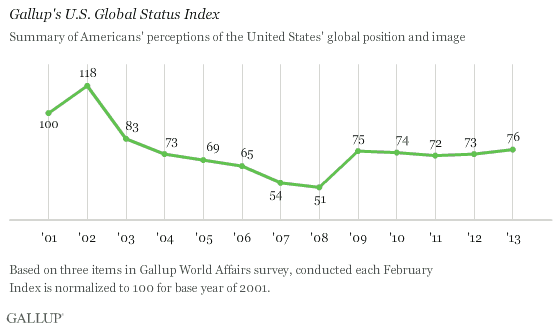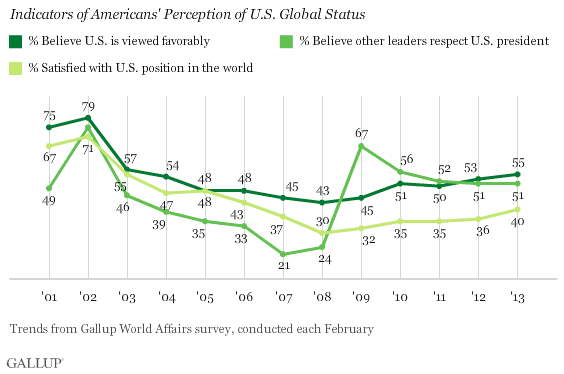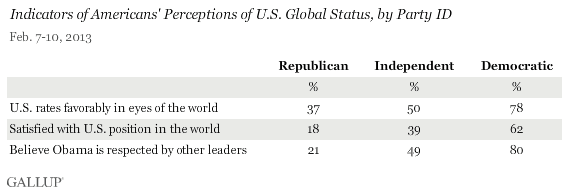PRINCETON, NJ -- Americans' view of how the United States is perceived in the world improved slightly in the past year, according to Gallup's U.S. Global Status Index. The index is at 76 in early February, up from 73 in 2012 and 72 in 2011, although similar to the 75 recorded when President Barack Obama took office in 2009.

The newly created index is based on three measures of the United States' global positioning in Gallup's annual World Affairs survey, conducted each February, and provides a useful summary of ratings that, separately, have followed somewhat different paths. Index questions include:
- Do you think leaders of other countries around the world have respect for [name of U.S. president], or do you think they don't have much respect for him?
- On the whole, would you say that you are satisfied or dissatisfied with the position of the United States in the world today?
- In general, how do you think the United States rates in the eyes of the world -- very favorably, somewhat favorably, somewhat unfavorably, or very unfavorably?
The index represents the average of positive responses across the three questions -- the percentage saying the president is respected, the percentage satisfied with the U.S. position in the world, and the total percentage saying the U.S. rates very favorably or somewhat favorably. The index was set at 100 for its inaugural 2001 reading, and other years' values are adjusted accordingly.
The trend documents an increase in positive sentiment in 2002 after global sympathy for the U.S. surged in the wake of the 9/11 terrorist attacks. By February 2003, as George W. Bush faced substantial international opposition to his determination to go to war with Iraq, Americans became less sure about the country's global standing, and those doubts continued to mount until Bush left office. The index partially rebounded after Obama took office, but has never fully recovered to the pre-9/11 level found in February 2001.
Americans Think U.S. and Obama Viewed Favorably
In terms of specific items that make up the U.S. Global Status Index, slim majorities of Americans in this year's World Affairs survey, conducted Feb. 7-10, believe the United States rates favorably in the eyes of the world (55%), and believe leaders of other countries largely respect President Obama (51%). Fewer Americans, 40%, are satisfied with the United States' overall position in the world, though this is up from last year.

Over the course of Obama's presidency, Americans have become more confident that the U.S. is viewed favorably, although, at 55%, positive sentiment remains well below the pre-9/11 and pre-Iraq war level found in February 2001 (75%).
The percentage of Americans saying Obama is respected globally, now 51%, has declined from the soaring 67% found in the initial period after his inauguration. And, since last year, it has been on par with how Americans perceived George W. Bush's international standing in early 2001. However, it is still significantly higher than Bush's rating on this dimension from 2003 through 2008.
The 40% currently satisfied with the country's position is the highest seen since 2006. Despite the steady increase in public satisfaction with the country's global position since the end of Bush's presidency, satisfaction remains far below the pre-9/11 reading of 67% found at the start of the last decade.
Americans' views about the United States', and President Obama's, world position are predictably partisan, with Democrats expressing much more positive views than Republicans. Independents' views fall a bit closer to Republicans' than to Democrats'.

Bottom Line
Americans' perceptions of the United States' status in the world have improved somewhat since the depths recorded during the Iraq war, which received lackluster international support and even criticism from some allies. However, the biggest gains are in perceptions of how the U.S. president is viewed internationally. The 51% currently believing Obama is respected by most other leaders is more than double the 21% saying this of Bush in 2007. And while this is down from the 67% for Obama in 2009, it roughly matches where Bush stood at the start of his first term, before the 9/11 attacks and subsequent Iraq war fundamentally altered the international landscape.
Over the course of Obama's presidency, the percentages of Americans saying they are satisfied with the nation's global position, and believing the U.S. rates favorably in the world, have increased -- but modestly. The current levels remain well below 2001 levels, perhaps reflecting the Iraq war's lasting impact on how Americans view the country's global standing.
Survey Methods
Results for this Gallup poll are based on telephone interviews conducted Feb. 7-10, 2013, with a random sample of 1,015 adults, aged 18 and older, living in all 50 U.S. states and the District of Columbia.
For results based on the total sample of national adults, one can say with 95% confidence that the margin of sampling error is ±4 percentage points.
Interviews are conducted with respondents on landline telephones and cellular phones, with interviews conducted in Spanish for respondents who are primarily Spanish-speaking. Each sample of national adults includes a minimum quota of 50% cell phone respondents and 50% landline respondents, with additional minimum quotas by region. Landline telephone numbers are chosen at random among listed telephone numbers. Cell phones numbers are selected using random digit dial methods. Landline respondents are chosen at random within each household on the basis of which member had the most recent birthday.
Samples are weighted to correct for unequal selection probability, nonresponse, and double coverage of landline and cell users in the two sampling frames. They are also weighted to match the national demographics of gender, age, race, Hispanic ethnicity, education, region, population density, and phone status (cellphone only/landline only/both, cellphone mostly, and having an unlisted landline number). Demographic weighting targets are based on the March 2012 Current Population Survey figures for the aged 18 and older U.S. population. Phone status targets are based on the July-December 2011 National Health Interview Survey. Population density targets are based on the 2010 census. All reported margins of sampling error include the computed design effects for weighting.
In addition to sampling error, question wording and practical difficulties in conducting surveys can introduce error or bias into the findings of public opinion polls.
View methodology, full question results, and trend data.
For more details on Gallup's polling methodology, visit www.gallup.com.
